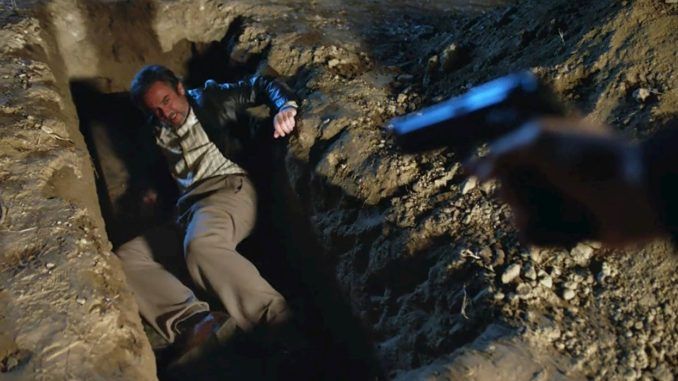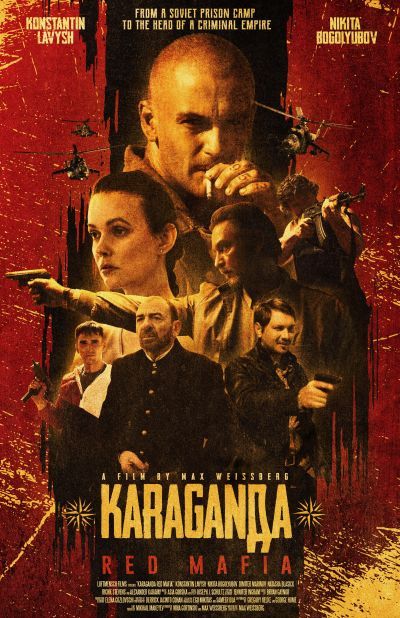
Rating: C+
Dir: Max Weissberg
Star: Konstantin Lavysh, Natasha Blasick, Nikita Bogolyubov, Dimiter D. Marinov
This took quite the long journey to the screen, Weissberg writing the first draft of the screenplay when he was a student in St. Petersburg. More than two decades later, it finally arrives, and… It’s pretty decent, though not without issues – some obvious. It helps that in Lavysh, there’s a performance at its heart which is able to sustain the viewer’s attention. He plays Vladimir Bernshtein, whom we first meet in 1994, digging a grave in the dirt of upstate New York. It’s apparently his own (top). From there, we bounce back and forth in time, in order to see how we got to that point. The saga truly begins in pre-glasnost Russia years earlier, when Vladimir was a smuggler of television sets.
Caught by the authorities, he was sent to ten years in a gulag. Worse, the wife to whom he was devoted, Elena (Blasick), was imprisoned as well. Trying to survive in a Soviet jail proves challenging, particularly for a Jew – although this does look rather more like it’s in SoCal than Siberia. Frostbite seems less a threat than melanoma, shall we say. In order to cope, and to help Elena, he joins up with the feared Vory v Zakonye, or Vors group. Naturally, their support is not easy to obtain, and comes at a harsh price. While it’s one that Vladimir is willing to pay, when he eventually gets out and is allowed to emigrate to the USA, the gang is unwilling to let him go.
 I think this works best when it’s keeping things on the small scale, in particular with the relationships between Vladimir and the other characters. As well as Elena, there’s Aleksei Rukov (Bogolyubov), a fellow prisoner. There’s a mutual debt there: Aleksei helps keep Vlad alive, after being given some home-grown penicillin by him. Or Vanya, the head of the Russian mafia in Brighton Beach, where Vladimir settles. That’s not a position you reach without being ruthless in your ways. Watching them interact is more interesting than you might expect; for whatever reason, Lavysh came over to me as something like a Soviet version of Joe Mantegna. He depicts Vladimir as loyal, dependable… and willing to do whatever it takes to get by.
I think this works best when it’s keeping things on the small scale, in particular with the relationships between Vladimir and the other characters. As well as Elena, there’s Aleksei Rukov (Bogolyubov), a fellow prisoner. There’s a mutual debt there: Aleksei helps keep Vlad alive, after being given some home-grown penicillin by him. Or Vanya, the head of the Russian mafia in Brighton Beach, where Vladimir settles. That’s not a position you reach without being ruthless in your ways. Watching them interact is more interesting than you might expect; for whatever reason, Lavysh came over to me as something like a Soviet version of Joe Mantegna. He depicts Vladimir as loyal, dependable… and willing to do whatever it takes to get by.
When the movie tries to go big, tends to be where the problems start. Early on, Vlad is sent to Russia on a mission which goes wrong; he’s kidnapped and pays off his abductors with counterfeit money. The resulting battle is plagued by third-rate CGI which had me fearing for the film (fortunately, it doesn’t repeat the mistake). The use of language is also awkward: in the gulag, we get a mix of Russian and English, which doesn’t make much sense. Finally, it does lose energy in the final act, perhaps because this is where it’s treading on territory which is over-familiar. Overall though, I think it was a little better than I expected, and offers a glimpse into a criminal subculture with which you’ll probably not be familiar.
